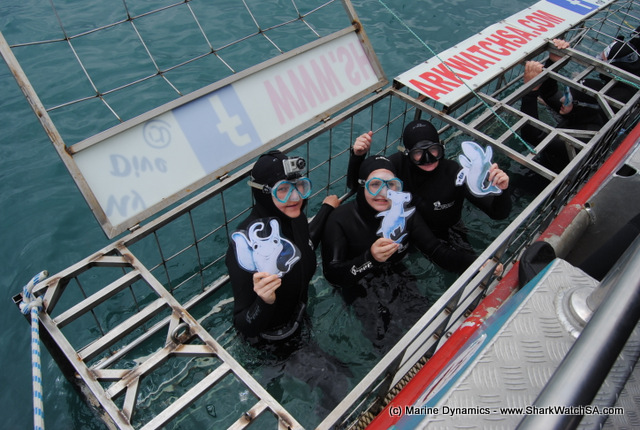Marine Dynamics teams up with Shark Stanley

.jpg)
Our Marine Volunteers jumped at the chance to take Shark Stanley and friends out to sea in order to protect sharks. But how does a shark cut out help with conservation?
From Shark Defenders: "In March 2013, the Convention on International Trade in Endangered Species of Wild Fauna (CITES) meeting will take place in Bangkok. With 176 member countries, this multilateral agreement protects more than 30,000 species globally and plays a powerful and key role in preventing extinction of many plants and animals by ensuring sustainable rates of trade.
There are three shark proposals and one manta ray proposal on the table for Appendix II CITES listing:
- The Scalloped Hammerhead Shark, one of the most iconic and endangered shark species with some of the most valuable fins in the market. Listed as Endangered globally on the IUCN Red List, hammerheads often aggregate, making them even more vulnerable to overfishing.
- The Porbeagle Shark, a large, warm-blooded temperate water shark targeted for both its large fins and meat. Their populations have been reduced by around 70%.
- The Oceanic Whitetip Shark, an open ocean species with large, highly valued fins; Critically Endangered in parts of it range and Vulnerable globally.
- Oceanic and Reef Manta Rays, some of the most stunningly charismatic wildlife in the oceans. Listed as Vulnerable globally, they have been targeted in recent years for an emerging international market for their gill rakers, which they use to filter plankton. Some populations have declined by as much as 85%.
At the CITES meeting in 2010, the passing of several shark proposals was only narrowly missed, needing only a small number of votes to pass. 2013 will be their year at CITES: the science is crystal clear, now we just need to do everything we can to make sure our country’s representatives vote YES!"
Marine Dynamics shark tours was contacted by the group spearheading this campaign (Yale School of Forestry and Environmental Studies, the Pew Environment Group, Shark Savers, and Shark Defenders) in order to bring Stanley to South Africa - a countr where the CITES ruling will have an immediate effect. So please, get Stanley out in your neiborhood now and start casting your vote for shark and ray protection.
- You can start by sending in your Shark Stanley photo. Downloads and simple instructions are here.
- If your organization would like to partner with Shark Stanley at CITES, put a link to this page on your website, then email us your logo and five photos of your friends with Shark Stanley to info@sharkdefenders.com. We'll post your logo and link to your website on a special sponsors' page.
- If you work with kids in schools, aquariums, museums (wherever!), we’d love to provide our activity booklet for free or help you to design a workshop on shark conservation.
_1420x587_crop_80.jpg)







